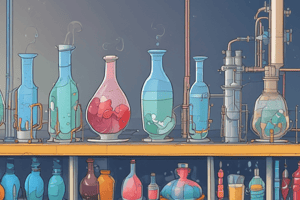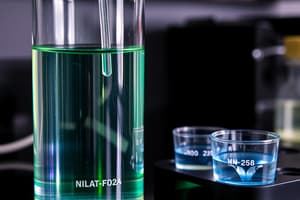Podcast
Questions and Answers
What is the purest form of naturally occurring water?
What is the purest form of naturally occurring water?
- Sea water
- Rain water (correct)
- Lake water
- River water
What type of impurities can cause turbidity and give smell or odor to water?
What type of impurities can cause turbidity and give smell or odor to water?
- Organic matter
- Dissolved salts
- Suspended impurities (correct)
- Dissolved gases
What is the main characteristic of lake water in terms of impurities?
What is the main characteristic of lake water in terms of impurities?
- It has a low amount of organic matter
- It has a constant composition of impurities (correct)
- It has a high percentage of dissolved salts
- It has a high amount of suspended matter
What is the most impure form of water?
What is the most impure form of water?
What can be removed by filtration from water?
What can be removed by filtration from water?
What type of impurities include CO2, Cl2, H2S, SOx, and NOx?
What type of impurities include CO2, Cl2, H2S, SOx, and NOx?
What can be added to neutralize the acidity produced by corrosion in boilers?
What can be added to neutralize the acidity produced by corrosion in boilers?
What is the primary reason for the formation of sludge in boilers?
What is the primary reason for the formation of sludge in boilers?
What is the main disadvantage of sludge formation in boilers?
What is the main disadvantage of sludge formation in boilers?
Where is sludge typically formed in a boiler?
Where is sludge typically formed in a boiler?
What happens when sludge is formed along with scales in a boiler?
What happens when sludge is formed along with scales in a boiler?
What is the result of excessive sludge formation in a boiler?
What is the result of excessive sludge formation in a boiler?
What is the formula to calculate the CaCO3 equivalent of a dissolved salt in water?
What is the formula to calculate the CaCO3 equivalent of a dissolved salt in water?
What is the unit of measurement for expressing CaCO3 equivalent hardness, which is equal to 1 milligram of CaCO3 equivalent hardness present in 1 liter of water?
What is the unit of measurement for expressing CaCO3 equivalent hardness, which is equal to 1 milligram of CaCO3 equivalent hardness present in 1 liter of water?
What is the primary contributor to the hardness of water?
What is the primary contributor to the hardness of water?
What is the complexing agent used in the EDTA method of determining water hardness?
What is the complexing agent used in the EDTA method of determining water hardness?
What is the relation between milligrams per liter (mg/lit) and parts per million (ppm) units of expressing CaCO3 equivalent hardness?
What is the relation between milligrams per liter (mg/lit) and parts per million (ppm) units of expressing CaCO3 equivalent hardness?
What is the formula of the Metal-EDTA complex formed in the EDTA method?
What is the formula of the Metal-EDTA complex formed in the EDTA method?
What is the purpose of percolating hard water through a zeolite bed in the zeolite process?
What is the purpose of percolating hard water through a zeolite bed in the zeolite process?
What happens to the zeolite when it is completely converted into calcium and magnesium zeolite?
What happens to the zeolite when it is completely converted into calcium and magnesium zeolite?
What is the purpose of treating the zeolite bed with a concentrated brine solution during regeneration?
What is the purpose of treating the zeolite bed with a concentrated brine solution during regeneration?
What is an advantage of the zeolite process for softening water?
What is an advantage of the zeolite process for softening water?
What is the hardness of the soft water obtained through the zeolite process?
What is the hardness of the soft water obtained through the zeolite process?
What is a limitation of the zeolite process?
What is a limitation of the zeolite process?
Why should turbidity and suspended matter be removed from water before zeolite treatment?
Why should turbidity and suspended matter be removed from water before zeolite treatment?
What is the preferred pH of water passing through a zeolite softener?
What is the preferred pH of water passing through a zeolite softener?
Why can't water containing Fe+2 and Mn+2 be used for zeolite treatment?
Why can't water containing Fe+2 and Mn+2 be used for zeolite treatment?
What is the ideal quality of boiler feed water?
What is the ideal quality of boiler feed water?
What is used as a softener in the demineralization process?
What is used as a softener in the demineralization process?
What is the characteristic of ion exchange resins that enables ion exchange?
What is the characteristic of ion exchange resins that enables ion exchange?
Flashcards are hidden until you start studying




